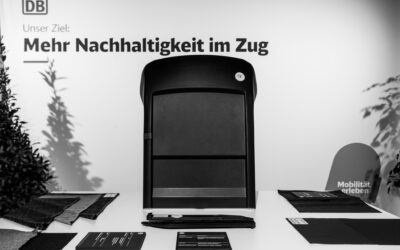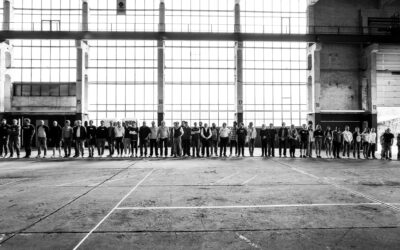The category Inside carbonauten deals with people, their personal motivation and their path in life. In the first interview with Torsten I want to explore the beginnings of carbonauten, and especially the imagineers behind it.
Aaron: Hey Torsten, can you describe the thought process from when Christoph and you first met until today in fast motion? Under what circumstances did you meet? How did you come up with the idea of starting a project together? When did you decide to pursue this so intensively?
Torsten: I first met Christoph in 2013, in my company at the time. We had an employee who was looking for a room for a meeting of Christoph and other experts from the charcoal industry. They planned on building a carbonization plant. I introduced myself to them, heard what they were doing, and at the time I already thought Christoph was very good, very competent. He was also the one that stuck in my head then. Afterwards, there was some exchange between us every once in a while.
I then started looking into carbon and discovered a fascination for it because I read about Terra Preta. This very fertile soil that the indigenous people of South America developed in the Amazon a few hundred years ago and that still works today. I found that really interesting. I was totally up for it and didn’t really feel like running my company anymore, because I realized that there was a lot more to it. I was also fascinated by the production plants. I’m a product designer with a strong affinity for machines and processes, as well as materials.
I then had the idea for Carbuna AG, and invited Christoph to come on board as a co-shareholder. But Christoph always said, “I can’t do that. I’m a managing director at another company and have a non-competition clause. But I think it’s cool what you’re doing.” Carbuna AG was also founded, but I never drew my stock option. The company still exists today. I believe they have developed quite well. They have good investors and specialize in soil additives.
During this time, Christoph realized that he wasn’t making much progress with his company either. So he was dissatisfied, and I was dissatisfied. And then in 2017 we decided to reset everything to 0. Christoph brings the machine technology, the know-how, and the practical experience. I bring the topics of material development and application development. And I wanted to make it big from the start.
Aaron: That means you knew from the beginning what scale carbonauten could take or did the dream grow a bit with the project?
Torsten: It grew with the project. When we founded, we were already planning to remove large amounts of CO2. In 2017, we already talked about the topic of emissions and energy during the first presentations of our start-up to investors. But that wasn’t really on their radar.
The decisive momentum was when the idea of mixing carbon into plastic came up. I already knew a bit about plastics because I had previously worked for Gardena with my company. Then I thought, well, they use other fillers, why not try carbon? We did that in 2019, and we put a lot of money into it. Money that we didn’t really have. We did an experiment at SKZ (one of the leading plastics centers). I had simply contacted them over the phone. “I’ll send you some carbon and you mix that into a bioplastic.” They did that and it worked. That was the key moment when we realized that it is much more than just agriculture. You can make amazing things out of this.
We then filed a patent on the combination of biocarbon with various binders. With minerals, plastics, earths, in other words, all kinds of things. The variety actually came only over time. In the beginning, you have to take a leap of faith and maybe you’re not brave enough to try something completely new, but Christoph was totally fascinated. I was a bit worried. Does he like it? What does he think? SInce agriculture is already working so well…. And then he saw this little injection-molded tray and said, “Yeah that’s awesome. You’re on the right track.” Then the idea came up to expand it into the construction industry and other industries. That’s how the basic idea behind carbonauten came about. To mix a very simple product into different materials for different industries.
What we have said from the beginning is still valid today. That we must be flexible regarding input as well as output. We must not be dependent on a biomass and we must not be dependent on a market. If the supply of a biomass breaks down or becomes more expensive, then you have a problem. When you have a total focus on one end product in the distribution market, that’s a huge risk. That makes it easier, but it’s also a huge risk.
We always enjoyed developing things in a creative way. That makes it more complicated, but it also makes it much more attractive. Due to the fact that everything is linked, we also noticed that agriculture definitely has a common basis with plastics and the construction industry.
Aaron: And everything surrounding the technology? Everything that concerns attitude? The idea of making manufacturing processes regenerative, and thus somewhat revolutionizing the economy? Was this your dream from the beginning, or did you only realize afterwards: “Ok, with these technological means it works”?
Torsten: Well, I’ve always been green, politically speaking, and Christoph also has a strong affinity with nature, but I was much more driven than he was, or maybe I still am. We both have an ecological basis, and for me ecology also includes a sense of community. We both have that. We both are, I can say this about Christoph, I hope that I am too, decent human beings. That is something that characterizes us. We have no airs and graces, money is not that important to us. We see the joy in what we do. To transmit this joy to others, that is actually much more important to us.
This topic of nature, and creating an economy in harmony with nature, that’s a wonderful topic. We can’t go back into the caves now. While that would be the best thing for humanity, we are naked apes in the end, and nothing else. But I had to try to find a consensus between what the planet allows and human behavior schemes.
The socio-political aspect is particularly appealing. A sense of community. Sharing. Letting others participate is something that also brings growth. We want to grow by sharing. Like an organism. A cell is dividing. And if it keeps on dividing, dynamically, then at some point a large organism is created. From a single cell that was once willing to divide. If the other cells do the same, then things work out. You can sense this thought, for example, regarding the Carbon Removal Fund. That’s where sharing is a really great driver. That’s a very high level of satisfaction. That’s what pushes us, to just have this damn good feeling.
Aaron: Nice transition. What were the best moments so far?
Torsten: Meeting Christoph, definitely. Then probably being on stage for the first time, and sweating, and never having made a pitch before. We both had companies before, we both had experience. But the start-up world was just something different. Then certainly founding, that is, going to the notary. With little money, scraped together somehow. A few thousand euros to start the company, while working on the side. Then it was certainly a great moment when we were at the carbonization plant in the Netherlands, when we saw the prototypes. Great moments were also when people said: “Wow, carbonauten, that sounds good. Great name, and you have a great performance. What you’re doing is great.” We got a lot of praise from all sides – but rarely any money – that was a problem. Then also to have caught the company again and again. These were always great achievements. Then having the first people come on board, where you realize they don’t really understand it, but somehow it seems to be something exciting for them. That’s really strange. You’re on a first-name basis right away, it’s all very collaborative, every new employee has added something new to it. To meet Cris Hedesiu, to bring on board the drivers of know-how. To simply have noticed that this topic is appealing to many, and that it is not about money, but about an attitude. This openness, when you feel the people can deal great with the freedom you give them. In the end, they are all little Christophs and Torstens. This is what drives many. Then it was certainly a great moment when the low loader brought the first piece to Eberswalde. And of course meeting lots of great people up there. A great moment was certainly also the ignition of the first retort. The first time we saw the furnace light up.
Aaron: In parallel, ever seriously considered just ditching it all? Or involuntarily thought, “Fuck, it’s over”?
Torsten: Well, the first one never. Never. Neither Christoph nor I. We aren’t the kind of people who can give up. It’s too much fun. At some point, you reach an age where you think to yourself, “What do you actually still have ahead of yourself? And how do you want to spend the last 30, maybe 40 years if things go well? There, the momentum of giving up does not exist. We’re both too much of entrepreneurs there.
So not even during the “challenges,” is what the politician would call them, and we had quite a few of those. Also private crisis, where you stand at the supermarket checkout and the card won’t work and the whole neighborhood stands in line behind you and stares at you why your card won’t work. You can’t pay for the items and you have 5 hungry kids at home. That’s not a pleasant moment. But for me, it was rather motivating. There’s a kind of rage that comes up inside you. “Why can’t we get sufficient funding for this?” Others can do it. Maybe we were being too honest there.
This anger is where I get my motivation from. Because it’s not just about Christoph and me, it’s about the great people who are on board with us. That is actually what I enjoy the most. Great people, who even in such difficult situations say: “I stand behind carbonauten 100%, how can I help?”. That’s pretty impressive, that’s great. So in the name of these people, we can never give up.



